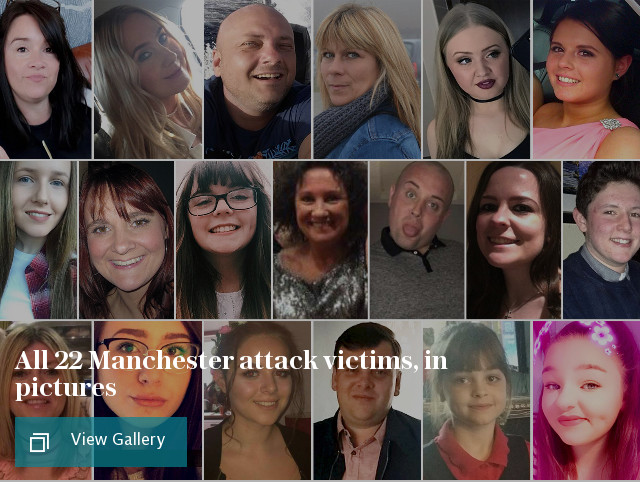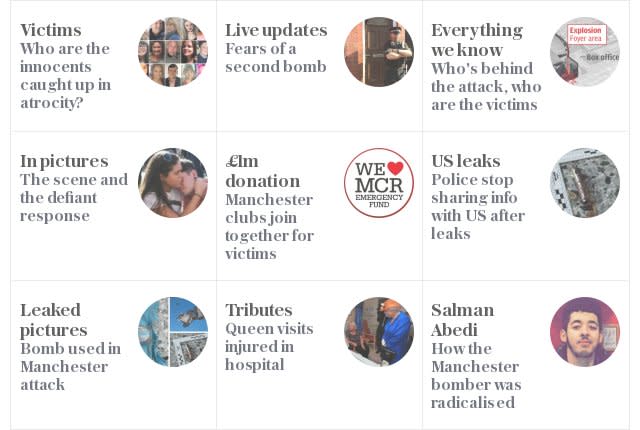'I saw people pulling together in a way that I have never seen before': Emergency service workers describe horror of Manchester bombing

It is what they do every day; saving lives and caring for the injured. But the scale of the horror that confronted them on Monday night was beyond any they have previously had to deal with.
Now Manchester's emergency service workers have spoken of the difficulties - professional and personal - they faced in dealing with the bloody aftermath of the attack at Manchester Arena.
Adam Reid, a reconstructive and plastic surgery consultant at University Hospital of South Manchester, told how he cuddled his children after returning home exhausted.
The surgeon finally left the hospital at 10pm, 15 hours after the start of his shift on Tuesday.
“I was just so tired and it was then I really started to think about those involved and what they had suffered,” he said. “I have two children myself so I went in to see them for a cuddle,” he said.

Mr Reid said that despite undergoing successful operations to their wounds, the psychological impact on his patients who survived the blast was likely to be lifelong.
He said colleagues in the hospital’s pediatric team had found it particularly difficult to deal with youngsters who came in unidentified, and said he had been “devastated” by stories he had heard from patients.
The thing I will remember more than any other is the humanity that was on display
Mr Reid, a trauma surgeon who has learned reconstructive techniques developed on the battlefield, said the attack produced the worst and greatest number he had seen.
“My second patient on Tuesday had complex limb injuries from shrapnel. A missile had taken out a chunk of bone in his lower leg and left a sizeable hole,” he said. “He also had injuries to his arm and chest, so the operation took about four hours.”
He said the force of the blast had driven shrapnel right through the teenager’s limbs destroying skin, muscle nerves and bone.
Mr Reid praised the “amazing work” of his colleagues and thanked the public for the £12,000 in donations towards a bar tab for medical staff at the hospital’s local pub, the Turing Tap.
Paramedic Dan Smith was at his home in the city centre when Salman Abedi set of his bomb and was the second medic on the scene, running the final 100 yards to get to the Arena.
“As I was running along Deansgate people were running in the opposite direction covered in blood. It was then the seriousness of the situation hit me,” he said. “‘I was faced with a lot of very scared people, a lot of badly injured people. There was a lot of confusion, a lot of distress.”
Mr Smith added: “I have been a paramedic for 17 years in Manchester and that night I saw people pulling together in a way I have never seen before. I saw police officers sat with injured people comforting them, holding their hand, I saw members of the public doing the same thing.
“The thing I will remember more than any other is the humanity that was on display. People were catching each other’s eye, asking if they were OK, touching shoulders, looking out for one other, saying thank you.”
I’ve been in operating theatres since 1988 and it’s the most upsetting thing I’ve ever seen
Adam Williams, another paramedic who was among the first on the scene, said: "I think we definitely saved lives that night. We instinctively forgot about our own safety.
"It was just harrowing. it was a scene of devastation; people will all kinds of injuries, people in sheer panic. It was constantly going through my mind, the events, what I saw, what i did, and I don't think I'll ever be able to get rid of that."
Chris Moulton, 60, an A&E consultant at Royal Bolton Hospital and vice president of the Royal College of Emergency Medicine, told of the growing wave of patients arriving at the hospital as the scale of the carnage emerged.
“At first we did not know if it was a bomb, if it was children, if we were going to be dealing with a few, dozens or hundreds of patients. The patients started coming in slowly at first. The injuries were almost all shrapnel injuries,” he told the Manchester Evening News. “‘People had been hit with bits of metals and nuts, a bit like bullets, which had penetrated into muscle, some very deep down to the bone.
‘People will be scarred for life mentally and physically by what happened. Monday night showed the best and worst of humanity. The best being the eagerness of people to help other humans. The worst being the desire of someone to maim and kill other human beings.”
Joanne O’Brien, a senior sister in the surgical department of Stepping Hill hospital, where six of the injured were treated, said what she saw that evening was the worst she had witnessed in her decades of nursing.
“Shrapnel is like a large bullet hole. It just destroys anything it goes through – arteries, bones, nerves, the lot. I’ve been in operating theatres since 1988 and it’s the most upsetting thing I’ve ever seen,” But what also remained with her when she returned home was the smile of one particular patient.
Ms O’Brien said: “She had extensive, horrendous injuries caused by the shrapnel, including broken bones and tissue damage. I talked to her just before she went to sleep for the operation and she was just holding my hand and saying ‘Thank you, thank you’.
“She was in a very bad way but was still smiling and saying thank you. That showed real humanity; I thought that was amazing.”


 Yahoo News
Yahoo News 